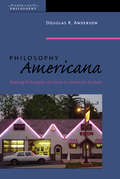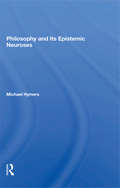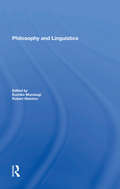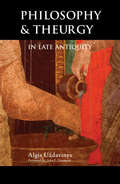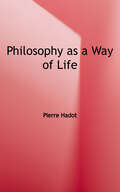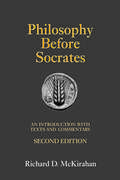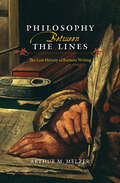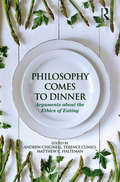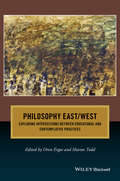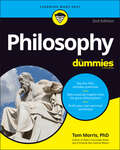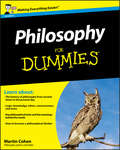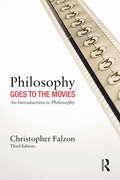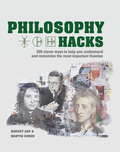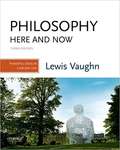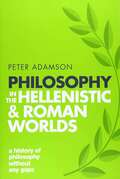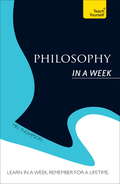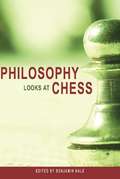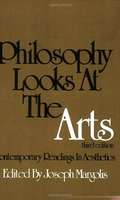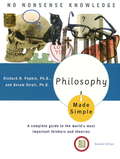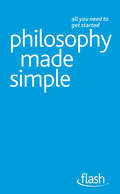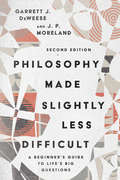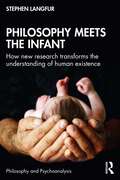- Table View
- List View
Philosophy Americana: Making Philosophy at Home in American Culture (American Philosophy)
by Douglas R. AndersonIn this engaging book, Douglas Anderson begins with the assumption that philosophy—the Greek love of wisdom—is alive and well in American culture. At the same time, professional philosophy remains relatively invisible. Anderson traverses American life to find places in the wider culture where professional philosophy in the distinctively American tradition can strike up a conversation. How might American philosophers talk to us about our religious experience, or political engagement, or literature—or even, popular music? Anderson’s second aim is to find places where philosophy happens in nonprofessional guises—cultural places such as country music, rock’n roll, and Beat literature. He not only enlarges the tradition of American philosophers such as John Dewey and William James by examining lesser-known figures such as Henry Bugbee and Thomas Davidson, but finds the theme and ideas of American philosophy in some unexpected places, such as the music of Hank Williams, Tammy Wynette, and Bruce Springsteen, and the writingsof Jack Kerouac.The idea of “philosophy Americana” trades on the emergent genre of “music Americana,” rooted in traditional themes and styles yet engaging our present experiences. The music is “popular” but not thoroughly driven by economic considerations, and Anderson seeks out an analogous role for philosophical practice, where philosophy and popular culture are co-adventurers in the life of ideas. Philosophy Americana takes seriously Emerson’s quest for the extraordinary in the ordinary and James’s belief that popular philosophy can still be philosophy.
Philosophy And Its Epistemic Neuroses
by Michael HymersThis book argues that analytical philosophy and radical theory alike stand in an ambivalent relationship with skepticism. It explains structuralism, feminist theory and critical theory to outline a therapeutic alternative to philosophical theoreticism.
Philosophy And Linguistics: The Theory And Applications Of Molecular Sememics (Studies In Linguistics And Philosophy Ser. #81)
by Kumiko Murasugi Robert StaintonIn the 1960s and 1970s questions about the semantics of natural languages were of central concern to the vast majority of analytic philosophers. The work of Chomsky, Davidson, Grice, Donnellan, Kaplan, Kripke and Putnam was widely read by non-specialists. The three main branches of linguistics that are of special philosophical significance-syntax,
Philosophy And Theurgy In Late Antiquity
by Algis UzdavinysThe ancient philosophy, in its original Orphico-Pythagorean and Platonic form, is not simply a way of life in accordance with the divine or human intellect (nous), but also the way of alchemical transformation and mystical illumination achieved through initiatic 'death' and subsequent restoration at the level of divine light. To use another mythical image, philosophy restores the soul's wings and leads the purified lover of wisdom to Heaven. As a means of spiritual reintegration and unification, ancient philosophy is inseparable from the hieratic rites. Therefore those scholars who themselves follow the anagogic path of Platonic tradition are more or less firmly convinced that their philosophy ultimately derives from the Egyptian and Mesopotamian temple liturgies and rituals, reinterpreted and revived by the Neoplatonists under the name of 'theurgy' in late antiquity. The theurgic 'animation' of statues appears to be among the main keys for understanding how various royal and priestly practices, related to the daily ritual service and encounter with the divine presence in the temples, developed into the Neoplatonic mysticism of late antiquity. The traditional theory of symbolism still stands on the Neoplatonic foundation established by Iamblichus, Proclus, and Damascius
Philosophy As a Way of Life: Spiritual Exercises from Socrates to Foucault
by Pierre HadotThis book presents a history of spiritual exercises from Socrates to early Christianity, an account of their decline in modern philosophy, and a discussion of the different conceptions of philosophy that have accompanied the trajectory and fate of the theory and practice of spiritual exercises. Hadot's book demonstrates the extent to which philosophy has been, and still is, above all else a way of seeing and of being in the world.
Philosophy Before Socrates: An Introduction with Texts and Commentary
by Richard D. MckirahanSince its publication in 1994, Richard McKirahan's Philosophy Before Socrates has become the standard sourcebook in Presocratic philosophy. It provides a wide survey of Greek science, metaphysics, and moral and political philosophy, from their roots in myth to the philosophers and Sophists of the fifth century. A comprehensive selection of fragments and testimonia, translated by the author, is presented in the context of a thorough and accessible discussion. An introductory chapter deals with the sources of Presocratic and Sophistic texts and the special problems of interpretation they present.In its second edition, this work has been updated and expanded to reflect important new discoveries and the most recent scholarship. Changes and additions have been made throughout, the most significant of which are found in the chapters on the Pythagoreans, Parmenides, Zeno, Anaxagoras, and Empedocles, and the new chapter on Philolaus. The translations of some passages have been revised, as have some interpretations and discussions. A new Appendix provides translations of three Hippocratic writings and the Derveni papyrus.
Philosophy Between the Lines: The Lost History of Esoteric Writing
by Arthur M. Melzer&“Shines a floodlight on a topic that has been cloaked in obscurity . . . a landmark work in both intellectual history and political theory&” (The Wall Street Journal). Philosophical esotericism—the practice of communicating one&’s unorthodox thoughts &“between the lines&”—was a common practice until the end of the eighteenth century. Despite its long and well-documented history, however, esotericism is often dismissed today as a rare occurrence. But by ignoring esotericism, we risk cutting ourselves off from a full understanding of Western philosophical thought. Walking readers through both an ancient (Plato) and a modern (Machiavelli) esoteric work, Arthur M. Melzer explains what esotericism is—and is not. It relies not on secret codes, but simply on a more intensive use of familiar rhetorical techniques like metaphor, irony, and insinuation. Melzer explores the various motives that led thinkers in different times and places to engage in this strange practice, while also exploring the motives that lead more recent thinkers not only to dislike and avoid this practice but to deny its very existence. In the book&’s final section, &“A Beginner&’s Guide to Esoteric Reading,&” Melzer turns to how we might once again cultivate the long-forgotten art of reading esoteric works. The first comprehensive, book-length study of the history and theoretical basis of philosophical esotericism, Philosophy Between the Lines is &“a treasure-house of insight and learning. It is that rare thing: an eye-opening book . . . By making the world before Enlightenment appear as strange as it truly was, [Melzer] makes our world stranger than we think it is&” (George Kateb, Professor of Politics, Emeritus, at Princeton University). &“Brilliant, pellucid, and meticulously researched.&” —City Journal
Philosophy Comes to Dinner: Arguments About the Ethics of Eating
by Terence Cuneo Andrew Chignell Matthew C. HaltemanEveryone is talking about food. Chefs are celebrities. "Locavore" and "freegan" have earned spots in the dictionary. Popular books and films about food production and consumption are exposing the unintended consequences of the standard American diet. Questions about the principles and values that ought to guide decisions about dinner have become urgent for moral, ecological, and health-related reasons. In Philosophy Comes to Dinner, twelve philosophers--some leading voices, some inspiring new ones--join the conversation, and consider issues ranging from the sustainability of modern agriculture, to consumer complicity in animal exploitation, to the pros and cons of alternative diets.
Philosophy East / West
by Sharon Todd Oren ErgasPhilosophy East/West showcases new scholarship in the philosophy of education and contemplative studies, paying particular attention to the intersection of mindfulness, evidence-based science, and wisdom traditions. Moves beyond simplistic explanations of "Eastern" and "Western" to explore the complexity and diversity of various wisdom traditions Investigates the effect of mindfulness-based curricular interventions on current educational theory and practice Uses insights from important Western philosophers--including Heidegger, Levinas, and Foucault--to situate contemplative practice within contemporary educational theory Emphasizes the importance of transcultural and intercultural approaches in the philosophy of education
Philosophy For Dummies
by Tom MorrisYou think, therefore you are. Get a straightforward rundown on philosophy from the ancient world to today If you’ve ever pondered your existence over your morning coffee or considered the nature of crime and punishment, you’re an amateur philosopher. From everyday questions about happiness and responsibility to deep, spiritual examinations about God and the cosmos, philosophy pervades every part of our lives. And even though it might seem complex at first glance, these questions that affect everyone on the planet can be understood and talked about by anyone! In Philosophy For Dummies, Dr. Tom Morris delivers a refreshing and engaging exploration of the fundamentals of philosophy and shows you that philosophy can be fascinating and fun at the same time. You’ll be introduced to topics like the meaning of life, religious belief, and ways to live in the most satisfying ways. You’ll also learn about the insights of some of history’s greatest philosophers. This book is full of the questions—and proposed solutions—to the questions that keep philosophers up at night, like: When should we doubt our beliefs and knowledge? Is there a God? What is His/Her/Their nature? Do we have free will or are we simply acting out physical imperatives? Whether you’re interested in the nature of the mind/soul versus the body, or you want to learn more about morals and ethics, Philosophy For Dummies will be your personal guide to some of life’s most enduring problems and questions.
Philosophy For Dummies, UK Edition
by Martin CohenConfused by metaphysics? In a muddle with aesthetics? Intimidated by Kant? Then look no further! Philosophy For Dummies, UK Edition is a complete crash-course in philosophical thought, covering key philosophers, philosophical history and theory and the big questions that affect us today. Tying in with standard UK curricula and including core topics such as logic, ethics and political philosophy, this impartial, expert guide cuts through the jargon to give you the facts. Whether you're a philosophy student or a complete beginner, Philosophy For Dummies, UK Edition will get you thinking and talking about philosophy in no time, and with maximum confidence.
Philosophy Goes to the Movies: An Introduction to Philosophy
by Christopher FalzonNow emulated in several competing publications, but still unsurpassed in clarity and insight, Philosophy Goes to the Movies: An Introduction to Philosophy, Third Edition builds on the approach that made the two earlier editions so successful. Drawing on many popular and some lesser known films from around the world, Christopher Falzon introduces students to key areas in philosophy, like: • Ethics • Social and Political Philosophy • The Theory of Knowledge • The Self and Personal Identity • Critical Thinking Perfect for beginners, this book guides the reader through philosophy using illuminating cinematic works, like Avatar, Inception, Fight Club, Wings of Desire, Run Lola Run, A Clockwork Orange, Blade Runner, Dirty Harry and many other films. The fully revised and updated Third Edition features: an expanded introduction that provides a new discussion of the relationship between film and philosophy; new material on notable philosophers such as Aristotle, Merleau-Ponty and Rawls; and coverage of new topics like virtue ethics and what Socrates offers for critical thinking. An updated glossary, references and bibliography, and a filmography, are also included in the Third Edition.
Philosophy Hacks (Hacks Ser.)
by Robert Arp Martin CohenDiscover the simple way to understand and remember the most groundbreaking concepts in 3,000 years of philosophical thought. Each idea is broken down into three stages: 1/ The helicopter view, which gives you an introduction to the idea, and some context around it. 2/ The shortcut, which gives you the core elements of the theory, along with a range of examples that everyone can understand. 3/ The hack, which is a one-liner designed to stick in your memory and give you an instant grasp of the concept.From Pascal's Wager to Kant's categorical imperative, and from Camus's Existential Nihilism to Arendt's Banality of Evil, there are 100 concepts explained. The perfect introduction to philosophy, this is a great new way to learn about the most important philosophical ideas and concepts in a way that makes them easy to recall even months after reading the book.
Philosophy Hacks (Hacks)
by Robert Arp Martin CohenDiscover the simple way to understand and remember the most groundbreaking concepts in 3,000 years of philosophical thought. Each idea is broken down into three stages: 1/ The helicopter view, which gives you an introduction to the idea, and some context around it. 2/ The shortcut, which gives you the core elements of the theory, along with a range of examples that everyone can understand. 3/ The hack, which is a one-liner designed to stick in your memory and give you an instant grasp of the concept.From Pascal's Wager to Kant's categorical imperative, and from Camus's Existential Nihilism to Arendt's Banality of Evil, there are 100 concepts explained. The perfect introduction to philosophy, this is a great new way to learn about the most important philosophical ideas and concepts in a way that makes them easy to recall even months after reading the book.
Philosophy Here and Now: Powerful Ideas in Everyday Life
by Lewis VaughnPhilosophy Here and Now: Powerful Ideas in Everyday Life, Third Edition, is a topically organized hybrid text/reader that helps students understand, appreciate, and even do philosophy. The book emphasizes philosophical writing, reinforced with step by step coaching in how to write argumentative essays and supported by multiple opportunities to hone critical thinking. It shows students how philosophy applies to their own lives and brings the subject to life with engaging chapter ending literary selections, abundant illustrations, and a wealth of pedagogical features.
Philosophy In The Hellenistic And Roman Worlds: A History Of Philosophy Without Any Gaps, Volume 2
by Peter AdamsonPeter Adamson offers an accessible, humorous tour through a period of eight hundred years when some of the most influential of all schools of thought were formed: from the third century BC to the sixth century AD. He introduces us to Cynics and Skeptics, Epicureans and Stoics, emperors and slaves, and traces the development of Christian and Jewish philosophy and of ancient science. Chapters are devoted to such major figures as Epicurus, Lucretius, Cicero, Seneca, Plotinus, and Augustine. But in keeping with the motto of the series, the story is told ''without any gaps,'' providing an in-depth look at less familiar topics that remains suitable for the general reader. For instance, there are chapters on the fascinating but relatively obscure Cyrenaic philosophical school, on pagan philosophical figures like Porphyry and Iamblichus, and extensive coverage of the Greek and Latin Christian Fathers who are at best peripheral in most surveys of ancient philosophy. A major theme of the book is in fact the competition between pagan and Christian philosophy in this period, and the Jewish tradition also appears in the shape of Philo of Alexandria. Ancient science is also considered, with chapters on ancient medicine and the interaction between philosophy and astronomy. Considerable attention is paid also to the wider historical context, for instance by looking at the ascetic movement in Christianity and how it drew on ideas from Hellenic philosophy. From the counter-cultural witticisms of Diogenes the Cynic to the subtle skepticism of Sextus Empiricus, from the irreverent atheism of the Epicureans to the ambitious metaphysical speculation of Neoplatonism, from the ethical teachings of Marcus Aurelius to the political philosophy of Augustine, the book gathers together all aspects of later ancient thought in an accessible and entertaining way.
Philosophy In a Week: Teach Yourself
by Mel ThompsonLearn in a week, remember for a lifetime!In just one week, this accessible book will give you knowledge to last forever. End of chapter summaries and multiple choice questions are all designed to help you test your knowledge and gain confidence. So whether you are a student or you simply want to widen your knowledge, you will find this seven-day course a very memorable introduction.Sunday: Think about knowledge like a philosopherMonday: Consider what science is and how we gain knowledge of the natural worldTuesday: Explore how we speak and think, and how this relates to the philosophy of mind.Wednesday: Learn how philosophers view and engage with religionThursday: Engage with ethics - how we decide what is the right thing to doFriday: Discover how political philosophers have balanced the role of government with individual freedom.Saturday: Explore continental ideas such as existentialism and how the next generation of philosophers may build on them.
Philosophy In a Week: Teach Yourself
by Mel ThompsonLearn in a week, remember for a lifetime!In just one week, this accessible book will give you knowledge to last forever. End of chapter summaries and multiple choice questions are all designed to help you test your knowledge and gain confidence. So whether you are a student or you simply want to widen your knowledge, you will find this seven-day course a very memorable introduction.Sunday: Think about knowledge like a philosopherMonday: Consider what science is and how we gain knowledge of the natural worldTuesday: Explore how we speak and think, and how this relates to the philosophy of mind.Wednesday: Learn how philosophers view and engage with religionThursday: Engage with ethics - how we decide what is the right thing to doFriday: Discover how political philosophers have balanced the role of government with individual freedom.Saturday: Explore continental ideas such as existentialism and how the next generation of philosophers may build on them.
Philosophy Looks at Chess
by Benjamin HaleChess, the ancient strategy game, meets the latest, cutting-edge philosophy in this unique book. When 12 philosophers weigh in on one of the world's oldest and most beloved pastimes, the results are often surprising. <P><P>Philosophical concepts as varied as phenomenology and determinism share the page with a treatise on hip-hop chess tactics and the question of whether Garry Kasparov is, in fact, a cyborg. Putting forth a remarkable array of different views on chess from philosophers with varied chess-proficiency, Philosophy Looks at Chess is an engaging read for chess adherents and the philosophically inclined alike.
Philosophy Looks at the Arts: Contemporary Readings In Aesthetics
by Joseph MargolisThe first edition of this widely used anthology offered a needed introduction to a new analytic aesthetics which has in the intervening years become even more influential. This new, revised and expanded edition has been designed by one of the leaders of the field to help define the structure of current aesthetics. Of the 24 articles included more than half are new to this edition. The new edition emphasizes opposing currents in aesthetics with contributions from the most active and influential writers in the field. It is a basic book for any library and is designed to provide both undergraduate and graduate students with a professional orientation in aesthetics. Author note: Joseph Margolis is Professor of Philosophy at Temple University. He is the author or editor of twelve other books as well as numerous articles.
Philosophy Made Simple (2nd Edition, Revised)
by Richard H. Popkin Avrum StrollFor almost four decades, Made Simple books have set the standard for continuing education and home study. In answer to the changing needs of today's marketplace, the Made Simple series for the '90s presents a thoroughly up-to-the-minute portfolio of skills, information, and experience, with revised and updated editions of bestselling titles, plus a whole range of new subjects from personal finance to office management to desktop publishing.
Philosophy Made Simple: Flash
by Mel ThompsonThe books in this bite-sized new series contain no complicated techniques or tricky materials, making them ideal for the busy, the time-pressured or the merely curious. Philosophy is a short, simple and to-the-point guide to philosophy. In just 96 pages, the reader will discover the ideas of all the key figures, from Socrates to Wittgenstein. Ideal for the busy, the time-pressured or the merely curious, Philosophy is a quick, no-effort way to break into this fascinating topic.UNDERSTAND COMPLEX CONCEPTSEXPLORE FUNDAMENTAL QUESTIONSBROADEN YOUR UNDERSTANDINGDISCOVER GREAT PHILOSOPHERSCLARIFY YOUR THINKING
Philosophy Made Simple: Flash
by Mel ThompsonThe books in this bite-sized new series contain no complicated techniques or tricky materials, making them ideal for the busy, the time-pressured or the merely curious. Philosophy is a short, simple and to-the-point guide to philosophy. In just 96 pages, the reader will discover the ideas of all the key figures, from Socrates to Wittgenstein. Ideal for the busy, the time-pressured or the merely curious, Philosophy is a quick, no-effort way to break into this fascinating topic.UNDERSTAND COMPLEX CONCEPTSEXPLORE FUNDAMENTAL QUESTIONSBROADEN YOUR UNDERSTANDINGDISCOVER GREAT PHILOSOPHERSCLARIFY YOUR THINKING
Philosophy Made Slightly Less Difficult: A Beginner's Guide to Life's Big Questions
by J. P. Moreland Garrett J. DeWeeseWhat is real?How do we know what we know?What is the right thing to do?What does it mean to be human?How should we view science and its claims?Why should we believe that God exists?
Philosophy Meets the Infant: How New Research Transforms the Understanding of Human Existence (Philosophy and Psychoanalysis)
by Stephen LangfurInfancy research and philosophy explore “first things,” yet few books bring the two fields into contact. Stephen Langfur’s Philosophy Meets the Infant integrates groundbreaking infancy studies of the last 50 years to offer a fresh exploration of our drive for human connection. He begins with a new understanding of self-awareness, which he locates in reciprocal attention between baby and caregiver. Instead of “I think, therefore I am,” the new research supports “You attend, therefore I am.” The event of becoming self-aware through another is termed a “You-I Event.”The idea is counterintuitive: we are perfectly self-aware when alone! To explain the change after infancy, Langfur makes transformative use of an old psychoanalytic finding. With the onset of language, a child internalizes (introjects) the most important You’s, playing them toward herself in speech. Instead of the original You-I Event, we have its counterfeit in our heads. Nevertheless, a longing for the true Event persists in the unconscious; individual chapters trace this longing in work, love, art, conversation, and religion.Organized into three parts (“The You-I Event in infancy and why it disappears," "The You-I Event after infancy," and "Philosophical Issues"), this book will be of keen interest to philosophers, infancy researchers, and anyone seeking new light on the major questions of human existence.
